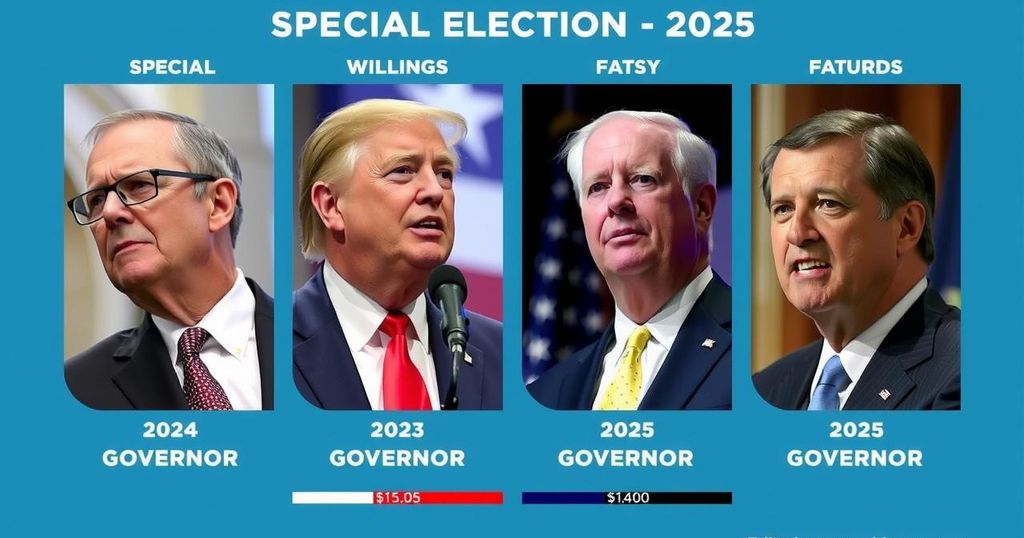Key 2025 Gubernatorial and Special Elections: Insights and Implications

The impending 2025 elections in Virginia and New Jersey are anticipated to reveal voter sentiments regarding the incoming Trump administration, with important gubernatorial contests highlighting demographic and policy concerns. Special elections in Florida and New York will further contribute to understanding broader national trends in party representation. Political strategies are evolving as candidates from both parties position themselves in a significantly altered electoral landscape.
As political dynamics shift following the tumultuous 2024 presidential elections, attention is now riveted on the pivotal 2025 gubernatorial and special elections in Virginia and New Jersey. These races are anticipated to serve as indicators of voter sentiment regarding the incoming Trump administration. With Virginia’s Lt. Gov. Winsome Earle-Sears and Rep. Abigail Spanberger set to vie for the governorship, the outcome may reflect public response to Trump’s early term decisions. In New Jersey, the contest could provide insights into the state’s political landscape as Republicans intend to capitalize on recent electoral trends, especially with term-limited Gov. Phil Murphy’s departure, leading to multiple candidates vying for the position.
In the special elections, Florida and New York will see races to replace notable Republican representatives. Trump’s endorsement is expected to significantly influence the dynamics of these contests, particularly in GOP-leaning districts. With various candidates emerging on both sides, the elections will not only shape state governance but also reflect broader national political currents. Voter engagement will be crucial as these races unfold, highlighting key issues such as immigration, economic policy, and social concerns that resonate with the public.
Virginia’s race is structured around a matchup that might not only set the tone for the state but also indicate national trends. With both leading candidates being women, it could mark a significant moment in political representation. Earle-Sears, endorsed by Youngkin, aims to consolidate the base, while Spanberger seeks to present a centrist alternative amid primary challenges. New Jersey’s environment is laden with political maneuvering, as candidates vie for democratic primaries, aiming to make substantial claims to address local issues like property taxes and economic conditions.
Additionally, special elections in Florida will test Trump’s influence and governance style as candidates compete to secure seats held by former representatives aligned closely with Trump’s policies. In New York, anticipation mounts regarding possible candidates to fill Stefanik’s seat. Both states reflect a growing anxiousness among voters regarding party representation and policy priorities.
With the overarching national discourse driven by Trump’s administration and its policies, the 2025 election results in Virginia, New Jersey, and the special contests in Florida and New York will serve as critical barometers for both local and national sentiments, potentially reshaping the political landscape heading into the midterms.
The political context for the 2025 election cycle is characterized by the recent upheaval surrounding the 2024 presidential election and the subsequent focus on state races. Notably, Virginia and New Jersey are poised to become battlegrounds, likely reflecting national trends relevant to former President Trump’s administration. With demographic shifts, economic concerns, particularly regarding taxation, and issues around public policy in the mix, both gubernatorial races in these states are expected to hold significant implications. The results will not only inform party strategies heading into the midterms but also influence voter turnout and alignment across the political spectrum.
The 2025 gubernatorial races in Virginia and New Jersey, along with special elections in Florida and New York, are critical in shaping the future political landscape. The outcomes will gauge public sentiment towards the policies of the incoming Trump administration, especially concerning immigration and economic reforms. Their results could pave the way for broader political changes as both parties strategize to appeal to evolving voter concerns regarding governance, representation, and socio-economic issues. This election cycle is expected to highlight the engagement of voters in response to shifting political tides, ultimately influencing national political narratives.
Original Source: www.washingtonexaminer.com







